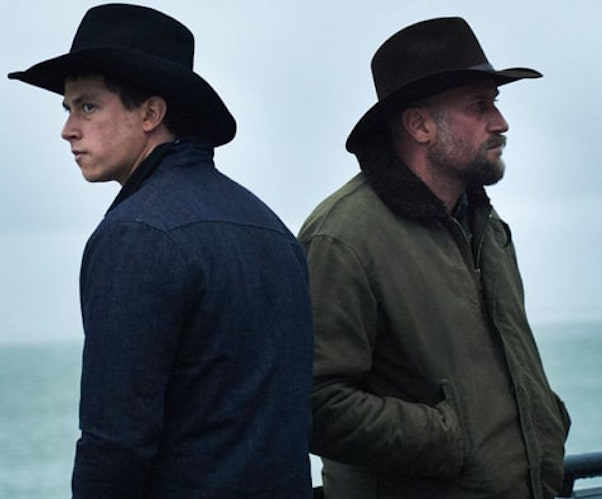Film Review: “Les Cowboys” — Atlas of Grief
Thomas Bidegain’s film Les Cowboys is political, but it is never heavy-handed.
Les Cowboys directed by Thomas Bidegain. Screening at the Kendall Square Cinema, Cambridge, MA.

Finnegan Oldfield and François Damien in “Les Cowboys.”
By Peg Aloi
This unusual French film begins softly, almost innocuously: a family of four goes to a country and western music festival, where Mom and Dad (Alain and Nicole), dressed in cowboy hats and shit-kicker boots, do some two-stepping, Dad sings “The Tennessee Waltz,” and the two teenage kids stand around looking a bit embarrassed. At the end of the evening, after a begrudging but wistful slow dance with her father, sixteen year old daughter Kelly (Iliana Zabeth) goes missing. Police are unhelpful, but interviews with Kelly’s friends reveal that she has probably eloped with her Muslim boyfriend Ahmed (Mounir Margoum). Alain (François Damien) is frantic, and Nicole (Agathe Dronne) is numb. Thirteen year old Georges (Finnegan Oldfield ) looks on, befuddled.
The film then chronicles a search that unfolds over years, goes global, and turns up few clues or leads to Kelly’s whereabouts. Time’s passing is measured via subtle clues of aging, unusual locations, and shifting attitudes, with the 9-11 attacks placed squarely in the middle, although only shown as a moment of TV footage watched silently by Kelly’s brother Georges. At one point, Kelly sends a brief letter saying she has chosen her new life with Ahmed. Ahmed’s father, also grieving a loss, meets periodically with the Ballands and, after Alain and Nicole split up, she cries over photos of Kelly’s newborn baby with Ahmed’s father (who is not named, but is played with sincere gravitas by Djemel Barek).
Once Alain moves out, he depends on Georges to accompany him on excursions to find Kelly, following random tips that she or Ahmed have been seen in Holland, in Belgium, in Afghanistan. Flat broke and obsessed, Alain gets Georges to siphon gas from trucks so they can continue searching, even though his father’s dogged quest has begun to wear on him. Years pass, and Georges gets a job working with Médecins Sans Frontières in Afghanistan, and meets an American mercenary who knows Georges is looking for his sister, and offers to help him find her. Played by John C. Reilly (an actor I generally dislike), the unnamed American convinces Georges to accompany him to Pakistan on horseback, where things get dangerous very quickly. At times, this segment feels oddly out of place, mainly because of Reilly’s American gregariousness and the actor’s habit of giving every character he plays the same mannerisms.
The title of the film comes to mind during this segment as well: the country-western motif (repeated when Alain runs into friends in this milieu whom he no longer has patience for) suggests that American values are somehow at the heart of this quest. And the cowboy imagery reinforces the notion that only a renegade, outsider approach will help locate Kelly. But Reilly’s mercenary proves unreliable, and Georges becomes embroiled in a political situation, not surprising given what’s happened after the American invasions of Afghanistan and Iraq. He finds Ahmed, but not Kelly, and the trail goes cold once again.
This ambitious and moving film has many moods, but they are overshadowed by the grief generated by years of unfruitful searching, despair that is memorably etched on the characters’ faces. Despite Reilly’s bull-in-a-china-shop appearance, the cast holds the storyline together with finesse. Directed by Thomas Bidegain (writer of A Prophet and Rust and Bone), and co-written with Noe Debre (their co-written Dheepan won the Palme d’Or at Cannes in 2015), this is an impressive directorial debut. The cinematography by Arnaud Potier is breathtaking, particularly in rural France and the mountains of Pakistan.
Bidegain’s movie is political, but it is never heavy-handed; the toll that endless wars takes on humanity is revealed in faces and gestures, not through platitudes or jingoism. Radical Islamic terrorism is never mentioned directly, but its reverberations are starkly felt. The displacement of refugees breeds contempt. Bidegain is clearly a director interested in dramatizing contemporary cultural conflicts, focusing on the human emotions that strike a common chord. He will be worth keeping an eye on in the years to come; no shortage of material awaits him.
Peg Aloi is a former film critic for The Boston Phoenix. She has taught film studies for a number of years at Emerson College and is currently teaching media studies at SUNY New Paltz. Her reviews have appeared in Art New England and Cinefantastique Online, and she writes a media blog for Patheos.com called The Witching Hour.

